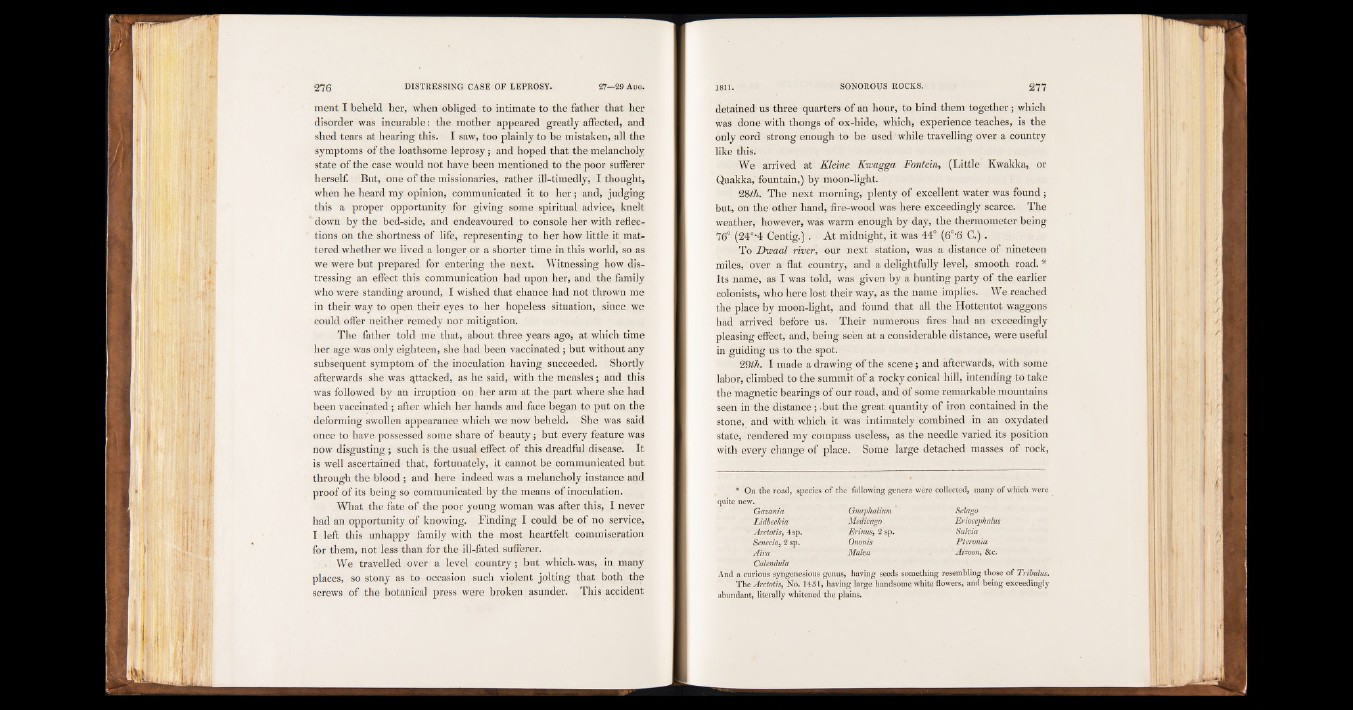
ment I beheld her, when obliged to intimate to the father that her
disorder was incurable: the mother appeared greatly affected, and
shed tears at hearing this. I saw, too plainly to be mistaken, all the
symptoms of the loathsome leprosy; and hoped that the melancholy
state of the case would not have been mentioned to the poor sufferer
herself. But, one of the missionaries, rather ill-timedly, I thought,
when he heard my opinion, communicated it to h e r; and, judging
this a proper opportunity for giving some spiritual advice, knelt
down by the bed-side, and endeavoured to console her with reflections
on the shortness of life, representing to her how little it mattered
whether we lived a longer or a shorter time in this world, so as
we were but prepared for entering the next. Witnessing how distressing
an effect this communication had upon her, and the family
who were standing around, I wished that chance had not thrown me
in their way to open their eyes to her hopeless situation, since, we
could offer neither remedy nor mitigation.
The father told me that, about three years ago, at which time
her age was only eighteen, she had been vaccinated ; but without any
subsequent symptom of the inoculation having succeeded. Shortly
afterwards she was attacked, as he said, with the measles; and this
was followed by an irruption on her arm at the part where she had
been vaccinated; after which her hands and face began to put on the
deforming swollen appearance which we now beheld. She was said
once to have possessed some share of beauty ; but every feature was
now disgusting; such is the usual effect of this dreadful disease. It
is well ascertained that, fortunately, it cannot be communicated but
through the blood ; and here indeed was a melancholy instance and
proof of its being so communicated by the means of inoculation.
What the fate of the poor young woman was after this, I never
had an opportunity of knowing. Finding I could be of no service,
I left this unhappy family with the most heartfelt commiseration
for them, not less than for the ill-fated sufferer.
• We travelled over a level country; but which.was, in many
places, so stony as to occasion such violent jolting that both the
screws of the botanical press were broken asunder. This accident
detained us three quarters of an hour, to bind them together; which
was done with thongs of ox-hide, which, experience teaches, is the
only cord strong enough to be used • while travelling over a country
like this.
We arrived at Kleine Kwagga Fontein, (Little Kwakka, or
Quakka, fountain,) by moon-light.
28th. The next morning, plenty of excellent water was found ;
but, on the other hand, fire-wood was here exceedingly scarce. The
weather, however, was warm enough by day, the thermometer being
76° (240,4 Centig.) . At midnight, it was 44° (6°*6 C.) .
To Dwaal river, our next station, was a distance of nineteen
miles, over a flat country, and a delightfully level, smooth road. *
Its name, as I was told, was given by a hunting party of the earlier
colonists, who here lost their way, as the name implies. We reached
the place by moon-light, and found that all the Hottentot waggons
had arrived before us. Their numerous fires had an exceedingly
pleasing effect, and, being seen at a considerable distance, were useful
in guiding us to the spot.
29th. I made a drawing of the scene; and afterwards, with some
labor, climbed to the summit of a rocky conical hill, intending to take
the magnetic bearings of our road, and of some remarkable mountains
seen in the distance ; .but the great quantity of iron contained in the
stone, and with which it was intimately combined in an oxydated
state, rendered my compass useless, as the needle varied its position
with every change of place. Some large detached masses of rock,
* On the road, species of the following genera were collected, many of which were
quite new.
Gazania Gnaphalium Selago
Lidbeckia Medicago Eriocephalus
• Arctotis, 4sp. Eiinas, 2 sp. Salvia
Se?iecio, 2 sp. Ononis Pteronia
Aira Malva ■ Aizoon, &c.
Calendula
And a curious syngenesious genus, having seeds something resembling those of Tribulus.
The Arctotis, No. 1451, having large handsome white flowers, and being exceedingly
abundant, literally whitened the plains.